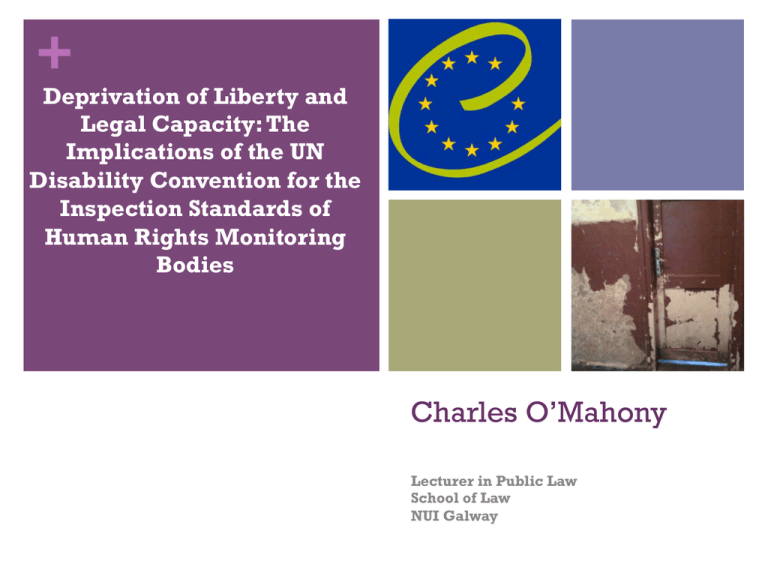+
advertisement

+ Deprivation of Liberty and Legal Capacity: The Implications of the UN Disability Convention for the Inspection Standards of Human Rights Monitoring Bodies Charles O’Mahony Lecturer in Public Law School of Law NUI Galway + Rights Based Approach to Disability n UN Convention on the Rights of Persons with Disabilities n Worldwide law reform agenda as state parties to the convention seek to ensure that their domestic law complies with its obligations under international human rights law n World Report on Disability (World Health Organization 2011) + CPT Standards & CRPD n CPT standards need to be reformulated to reflect the human rights of persons with disabilities as articulated in the CRPD and in particular the ‘paradigm shift’ in thinking on legal capacity as set out in Article 12. n The focus of the CPT standards should be on critiquing detention of persons with disabilities as an unjustifiable interference with their legal capacity. n CPT should further embed the right to independent living and inclusion in the community (Article 19 CRPD) in their standards. + COE & Article 12 CRPD The Council of Europe Commissioner for Human Rights in 2012 published an Issue Paper on legal capacity entitled – ‘Who Gets to Decide? Right to Legal Capacity for Persons with Intellectual and Psychosocial Disabilities’. n In the paper the Commissioner for Human Rights identified that the ‘right of persons with disabilities to make choices about their lives and enjoy legal capacity on an equal basis with others is one of the most significant human rights issues in Europe today’. The commissioner acknowledged that the ‘bulk of European legal capacity systems are out-dated and in urgent need of law reform’. n Made a number of recommendations to Council of Europe member states, with a view to ensuring that persons with mental health problems and intellectual disabilities effectively enjoy the right to legal capacity. n + COE & Article 19 CRPD n The Council of Europe Commissioner for Human Rights in 2012 published an Issue Paper on independent living entitled “The Right of People with Disabilities to Live Independently and be Included in the Community” + ECtHR Case Law n Winterwerp v Netherlands 6301/73 ECHR 4, 24 October 1979 n Shtukaturov v Russia Application No 44009/05, 27 June 2008 n Stanev v Bulgaria (Application no 36760/06) 17 January 2012 n DD v Lithuania (Application no 13469/06) 14 February 2012 n Kędzior v Poland (Application no 45026/07) 16 October 2012 + CPT 2011 Revised Document n The organisational structure of health-care services for persons with psychiatric disorders varies from country to country, and is certainly a matter for each State to determine. Nevertheless, the CPT wishes to draw attention to the tendency in a number of countries to reduce the number of beds in large psychiatric establishments and to develop community-based mental health units. The Committee considers this is a very favourable development, on condition that such units provide a satisfactory quality of care. n It is now widely accepted that large psychiatric establishments pose a significant risk of institutionalisation for both patients and staff, the more so if they are situated in isolated locations. This can have a detrimental effect on patient treatment. Care programmes drawing on the full range of psychiatric treatment are much easier to implement in small units located close to the main urban centres. + CPT 2011 Revised Document n Limited statement on challenging institutionalisation that does not include other groups of persons with disabilities at risk of institutionalisation. + Conclusions n The ECtHR also is edging closer to an interpretation of legal capacity based on Article 12 CRPD? n Legal capacity is a gatekeeper right and restrictions on legal capacity have led to the denial of both civil and political and social, economic and cultural rights to persons with disabilities and resulted in institutionalisation, violence, exploitation and abuse. n The CPT standards should embed the right to legal capacity and the right to live independently in the community and to be included in the community. + Conclusions n The principles underlying the CPT standards are as equally important as the CPT standards themselves, particularly in terms of ensuring that states understand their obligations under international human rights law. n CPT need to continue to develop its position.



